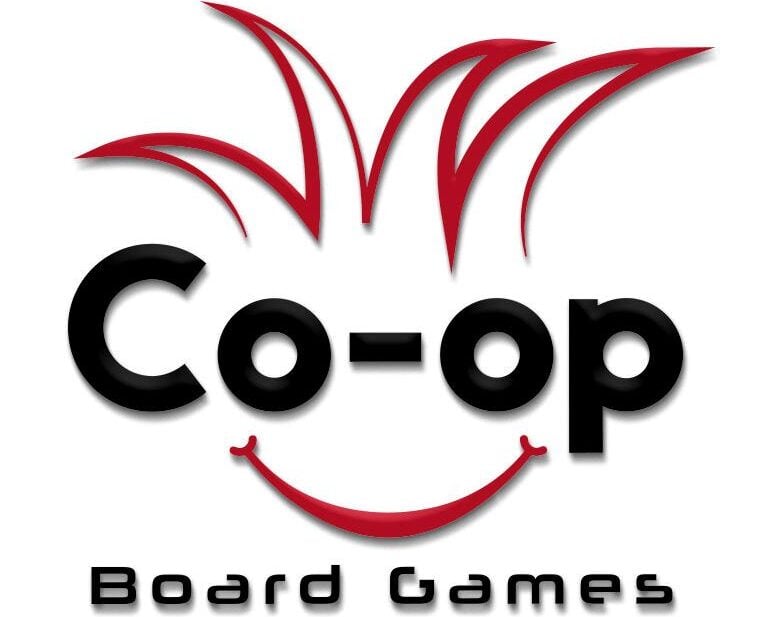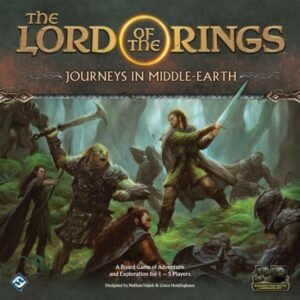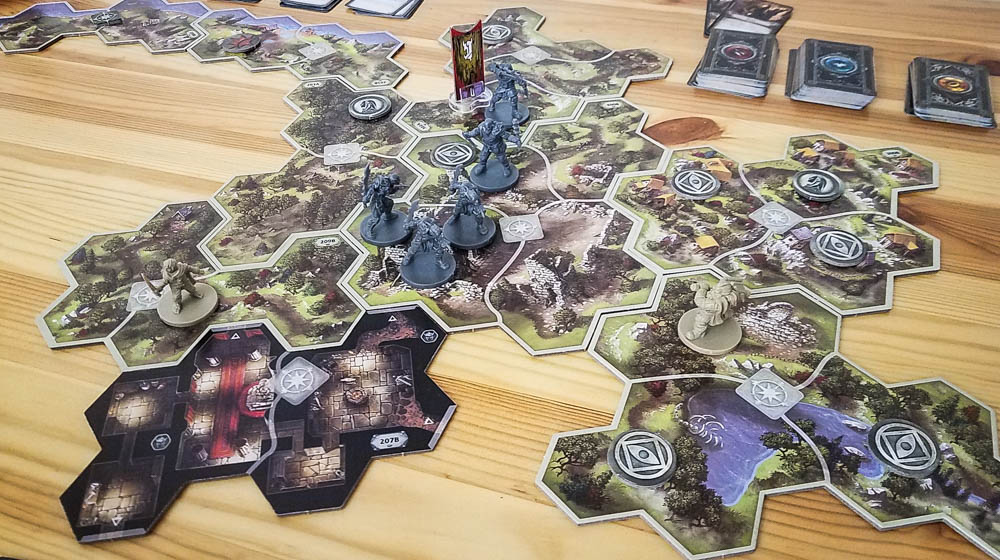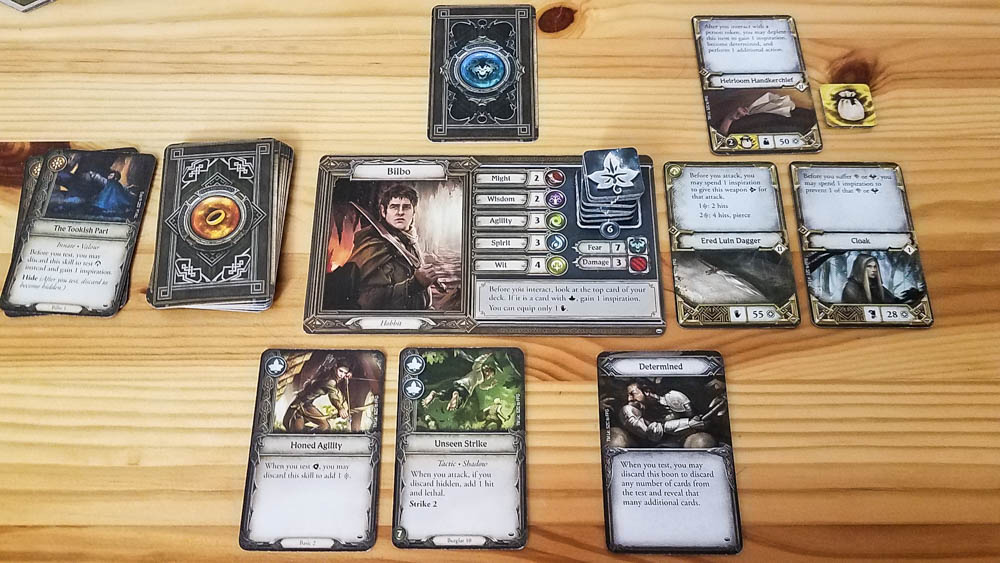The Lord of the Rings: Journeys in Middle-earth Review
Year: 2019 | Players: 1-5 | Minutes: 60+ | Ages: 14+
This The Lord of the Rings: Journeys in Middle-Earth review was made after playing through one full two-player campaign and three games in a four-player campaign.
What is Journeys in Middle-earth?
The Lord of the Rings: Journeys in Middle-earth is an app-driven cooperative adventure game in which you play as heroes who need to explore the land, use skills to survive, and complete objectives. The five heroes included in the game are Legolas, Gimli, Beravor, Aragorn, Bilbo, and Elena. This original story that you play through is set between the events of The Hobbit and The Lord of the Rings.
Journeys in Middle-earth was designed by Nathan I. Hajek and Grace Holdinghaus, and published by Fantasy Flight Games. There is one campaign (Bones of Arnor) that you get with the game and, at the time of this review, one additional campaign (Hunt for the Ember Crown) that you can buy in the app.
Rules Overview
In The Lord of the Rings: Journeys in Middle-earth, you’ll be playing through several adventures, each giving you objectives that you need to complete. If you’re playing an adventure on the journey map, the app will tell you the map tiles, tokens, and enemies that you need to grab as you explore. Adventures on the battle map are similar, but you play on just two square boards.
Each hero starts with a deck of 15 skill cards. You’ll have five of your hero’s unique cards, three role cards for whichever role you chose, six basic cards, and one Weakness card (basically just a dead card in your deck). You’ll also have Item cards (weapons, armor, etc.) that stay in play throughout the game.
Each hero gets to take two actions per round. There are three types of actions:
- Travel – You can move two spaces per travel.
- Attack – If an enemy is within range, you can perform an attack test (more on tests below) by choosing an item to use, drawing cards, and inputting your hits in the app.
- Interact – If there’s a person, search, or threat token in your space, you can interact with it by tapping on it in the app.
Often you’ll have opportunities to scout during the game. For example, once per round you’ll “Scout 2” during the Rally phase, which means that you draw two cards, optionally “prepare” one of them by placing it face-up in front of you, and put the other card on the top or bottom of your deck. You can use the abilities on your prepared cards when you need to.
Each hero has five stats: might, wisdom, agility, spirit, and will. When you need to perform a test, you’ll check your stat for the skill you’re testing, draw that many cards, and see how many success icons you get. You can also convert Fate icons into successes by spending your Inspiration tokens. When you’re testing, the abilities on the cards don’t matter, just the icons.
After every hero has taken a turn, the enemies activate and the threat increases. The app tells you how many spaces each enemy moves and who they’re targeting with their attacks. The threat rises based on how many heroes are playing and how much of the map you’ve explored. When the threat reaches certain thresholds, an event will take place (always bad) or the game will end in a loss if it reaches the end of the threat bar.
If your hero ever reaches their damage or fear limit, you’ll have to make a Last Stand test. If you fail the test, you’re defeated and the other heroes have until the end of that round to complete the adventure’s objective.
Regardless of whether you win or lose an adventure, you’ll still move forward in the campaign. At the end of an adventure, your heroes will have a chance to use their experience and lore points to upgrade their skills and items.
Check out the The Lord of the Rings: Journeys in Middle-Earth rulebook (PDF) for more info on how the game plays.
Pros and Cons
Pros
- I think the whole card system in LOTR: Journeys in Middle-earth is just fantastic. Scouting is great because it creates some interesting decisions about which cards to prepare and which ones to put back in the deck. The test system is probably the highlight of the game, though, because it gives you the same type of excitement you get with dice, but you have more control thanks to the scouting that you do, the Inspiration tokens, and the fact that you know the make-up of your deck.
- The heroes all feel different. They have their own stats and abilities, they have unique skills, and the roles you choose will change how the characters play. After you get used to your hero’s deck, it becomes pretty obvious that you need to approach each adventure a bit differently than everyone else. Plus, it’s a ton of fun upgrading your deck after each adventure and there are even some great moments when you’ll gain some powerful cards in the middle of the adventures that stay in your deck for the rest of the campaign. All of that stuff does the job of making you feel like a unique character in the story.
- It’s also very cool that the decisions you make during each adventure can have an impact on the rest of the campaign. If you respond a certain way to a person you run into, you may hear about it later on in the story, which is pretty awesome.
- I really like the way threat works. You want to interact with everything and fight every enemy, but you usually can’t do that since the threat is going to continue to increase and throw more enemies and other bad stuff at you. It puts a good amount of pressure on you to make smart decisions about where to go, when to search, and when to fight.
- The app does all of the fiddly work for you. It keeps track of all of the enemies’ stats and the threat, and every interaction is handled there rather than in a book or on cards. It makes the game play very smoothly.
- I also love that the app shows where future map tiles are going to go. That makes it very easy to set up the play area.
- The map tiles are great. Most of them have nice countryside artwork and the different areas on each tile are even referenced in the story from time to time.
- The Learn to Play and Rules Reference rulebooks are excellent. The Learn to Play guide quickly gets you ready to play your first game and the Rules Reference answers any questions you have while playing.
Cons
- There’s no way to undo mistakes you make in the app, which is crazy to me. If you misclick, you’re stuck with whatever happened. That’s only happened twice to my groups so far, but both times it was very annoying.
- It’s pretty disappointing that there aren’t any one-off scenarios. Maybe they’ll be added in later, but it would have been nice to have that option right away.
- I don’t hate the small cards, but shuffling them is no fun and I think some people will struggle with the tiny text.
- There is one downside to the two-player game: on the larger maps you don’t get to use as many cooperative actions. You pretty much have to split up to explore, so you won’t have as many chances to inspire each other or use other abilities that let you help your teammates.
Final Thoughts
Yeah, I’m a big fan of The Lord of the Rings: Journeys in Middle-earth. The card system is amazing, the story kept me interested throughout the campaign, and the game looks great on the table. I do think the app could use a few tweaks and I think the game should have come with at least a couple of one-off scenarios, but on the overall, I’m very happy with it and I’m looking forward to playing the Hunt for the Ember Crown campaign.
I’ve never played Fantasy Flight’s other popular app-driven game, Mansions of Madness: Second Edition, because that theme doesn’t really interest me, but now I see why so many people love these games (Update: I’ve now played MoM; it’s excellent, though I still prefer this game). The app does a lot of the work for you without completely taking over the experience, and it makes what would have been a very fiddly game a very smooth one.
This is the fourth cooperative Tolkien board game that I’ve played after Reiner Knizia’s Lord of the Rings, The Lord of the Rings: The Card Game, and The Hobbit: An Unexpected Journey, and I’d rank it just behind the card game… as a two-player game. I’d say it’s the best 3-5 player Tolkien co-op game.
If you’re a fan of The Lord of the Rings and don’t mind apps in board games, I highly recommend playing The Lord of the Rings: Journeys in Middle-earth. It’s one of my favorite cooperative games of 2019.
- Update: LOTR: Journeys in Middle-earth was included on the Best Cooperative Board Games of 2019 list!
- Update 2: It was also included on the Top 10 Adventure Board Games list!
- Update 3: It’s now on the Best Dungeon Crawling Board Games!
- Update 4: And now it’s on the Best Storytelling Board Games list!
- Update 5: Another list! It’s now one of our Best Role-Playing Board Games!
LOTR: Journeys in Middle-earth Links
BGG | Amazon | Miniature Market
Thanks for taking the time to read our The Lord of the Rings: Journeys in Middle-earth review!
Be sure to also take a look at our Best Cooperative Board Games list and other rankings.
Be sure to subscribe to our newsletter if you want more co-op board game content sent right to your inbox!




